A tale of murderous indifference: ‘The Zone of Interest’ offers a view of the Holocaust as chilling as its architects
| Published: 03-22-2024 10:09 AM |
Hannah Arendt famously coined the term “the banality of evil” in her book on Adolph Eichmann’s trial in Israel in 1963, where the former Nazi official, a key organizer of the Holocaust, presented himself as a bureaucrat who was “just doing his job” in the effort to murder millions of Jews and other people during World War II.
“The Zone of Interest,” the Academy Award winning British-Polish movie set at the infamous Auschwitz concentration camp, may have coined another term: the indifference of evil.
There are no scenes of violence and brutality in “The Zone of Interest,” currently playing at Amherst Cinema: none of the random shootings, terrorizing mass roundups, or the Nazis’ ritual humiliation of Jews that marked Holocaust films such as “Schindler’s List” and “The Pianist.”
Mass murder is instead a backdrop — part visual, part aural — to a story centered on Rudolf Höss (Christian Friedel), the Auschwitz commandant, and his wife, Hedwig (Sandra Hüller), who with their five children live in a well-scrubbed house, complete with an extensive garden and grounds, right next to one of the walls of the camp.
It’s 1943, and smoke billows regularly in the distance from crematoria that always seem to be operating, chimney fires glowing red at night, as well as from trains bringing more prisoners to the camp. Gunshots, shouted orders, and cries of pain and terror can be heard from time to time.
But for the Höss family, life is mostly a pastoral idyll, or so they’d like to believe: picnicking by a lake, kayaking on a river, and eating fresh food from the garden that Hedwig tends assiduously (with the help of prison laborers, who spread human ash as fertilizer).
“We’re living how we dreamed we would,” Hedwig says to her husband. “Beyond how we dreamed. Out of the city finally. Everything we want on our doorstep. And our children strong and healthy and happy. Everything the Führer said about how we should live is exactly what we do.”
Rudolph Höss is more phlegmatic administrator than fervent anti-Semite. He’s impressed when two representatives from a German company show him blueprints for a more efficient crematoria system that will enable Auschwitz to increase its “load capacity,” and his only show of emotion comes when, pending a transfer to another job in the concentration camp system, he tells his horse he loves him and will miss him.
Article continues after...
Yesterday's Most Read Articles
 Police report details grisly crime scene in Greenfield
Police report details grisly crime scene in Greenfield
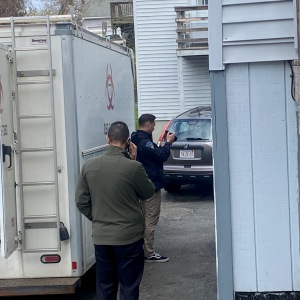 Authorities ID victim in Greenfield slaying
Authorities ID victim in Greenfield slaying
 State records show Northfield EMS chief’s paramedic license suspended over failure to transport infant
State records show Northfield EMS chief’s paramedic license suspended over failure to transport infant
 New buyer of Bernardston’s Windmill Motel looks to resell it, attorney says
New buyer of Bernardston’s Windmill Motel looks to resell it, attorney says
 On The Ridge with Joe Judd: What time should you turkey hunt?
On The Ridge with Joe Judd: What time should you turkey hunt?
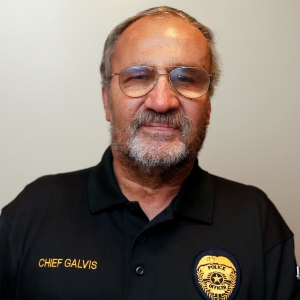 Ethics Commission raps former Leyden police chief, captain for conflict of interest violations
Ethics Commission raps former Leyden police chief, captain for conflict of interest violations
Friedel does a convincing job bringing the robotic monstrosities of Höss to life. Auschwitz’s longest-serving commandant, he played a key role in introducing the use of the pesticide Zyklon B for gassing prisoners, and he remained largely unrepentant about his crimes right up to the day he was hanged in 1947, on a gallows erected just outside the death camp.
And Hüller, as Hedwig, is mostly cool and brisk in her role as mother and queen of the house, though she can lash out dangerously when she’s angry, such as when she tells one of her trembling maids “I could have my husband spread your ashes across the fields.”
It’s Rudolph and Hedwig’s utter indifference to what’s taking place right outside their door that gives “The Zone of Interest” its chill, one that makes the film more disturbing in some ways than movies like “Schindler’s List.” They’re raising their children under a grotesque pretense of normalcy, even as ashes and the stink of burning flesh waft around them.
Jonathan Glazer, the director and screenwriter of “The Zone of Interest,” which won an Oscar earlier this month for Best International Feature Film, reinforces that mood with a grinding, disturbing soundtrack that mixes industrial noise, synthesizers, varied voices, and dense choral music; the film also won an Oscar for Best Sound.
That sound assaults you, especially as the movie opens with an extended blank screen. The aural attack is abruptly replaced by birdsong as the camera lands on the Höss family relaxing by a small lake.
Glazer also used a special camera to film scenes at night in which a young Polish girl — the sequences were inspired by a real-life figure, the late Aleksandra Bystron Kolodziejczyk — leaves food at worksites outside the camp for prisoners to find. These infrared images, coupled with the eerie soundtrack, add another level of foreboding.
Ultimately, though, “The Zone of Interest,” based loosely on Martin Amis’ novel of the same name, builds its ominous atmosphere with images of quotidian life in the Höss household, tilted on an axis as they are, like Hedwig trying on a fur coat taken from a dead prisoner, or Rudolph reading “Hansel and Gretel” to one of his daughters. (The story involves a witch being burned alive in an oven.)
At one point, Hedwig’s mother comes to visit and looks admiringly at the clean house, the spacious yard and garden, and the retinue of servants at her daughter’s command and says “You really have landed on your feet, my girl.”
She wonders, though, about the makeup of the maids who serve Hedwig: “Jews, in the house?”
Oh no, says Hedwig, gesturing to the death camp next door: “The Jews are over the other side of the wall. [The maids] are local girls.”
A few cracks do appear in this carefully constructed facade. Hedwig’s mother wakens one night and looks out the bedroom window to see the crematoria fires flaring; she seems to wrinkle her nose from an unpleasant smell and leaves the next morning without notice.
A “crisis” arises late in the film when Rudolph is assigned to a new job near Berlin. Hedwig, in tears, refuses to move, saying her job is to stay in their lovely Auschwitz home to raise the children.
But all is not lost. In early 1944, Nazi leadership announces a new plan to ship 700,000 Hungarian Jews to Auschwitz, and Rudolph is reassigned to the camp as the best man to oversee this huge logistical challenge.
“I’m pleased as punch,” he tells Hedwig in a phone call from Berlin, where he attends a grand party staged by the SS.
And when she asks him who was at the big fete, he says “To tell you the truth, I wasn’t really paying attention. I was too busy thinking how I’d gas everyone in the room. Very difficult, logistically, because of its high ceiling.”
“The Zone of Interest” has earned a number of other awards and widespread praise, though there are naysayers: The New York Times dismissed it as a “hollow, self-aggrandizing art-film exercise.”
I disagree. The movie, in its utter lack of sentimentality and the icy, controlled performances of Friedel and Hüller, makes for an apt study of humanity’s ever-present capacity for violence, depravity, and indifference to suffering.
“The Zone of Interest” (in German with subtitles) plays at Amherst Cinema through at least March 28. It’s also available for rent or purchase on some streaming services such as Amazon Prime.
Steve Pfarrer can be reached at spfarrer@gazettenet.com.

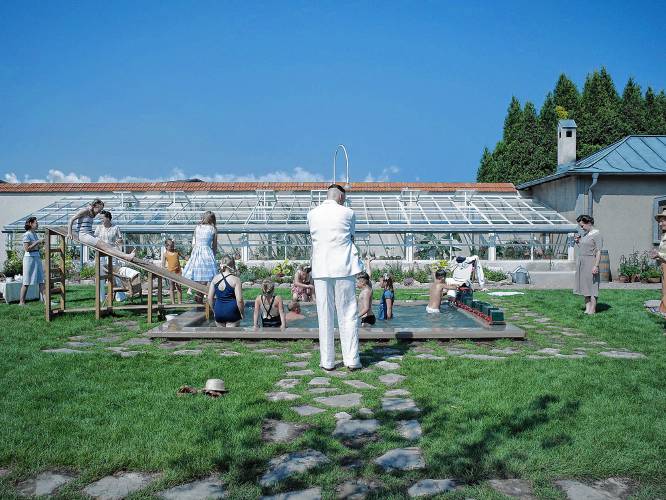
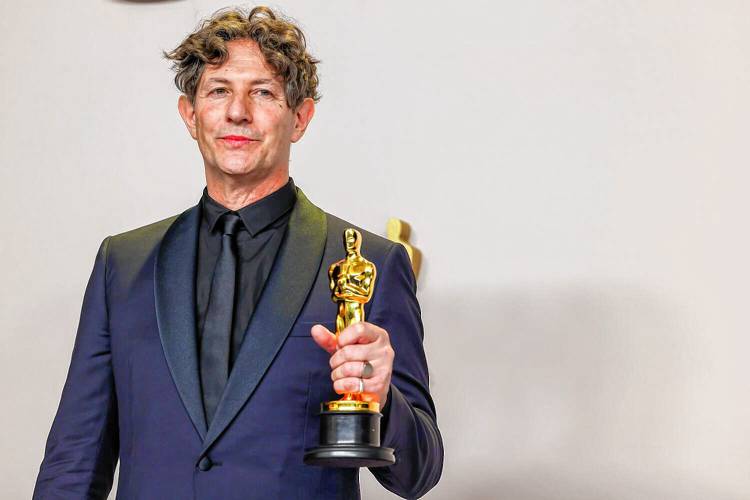
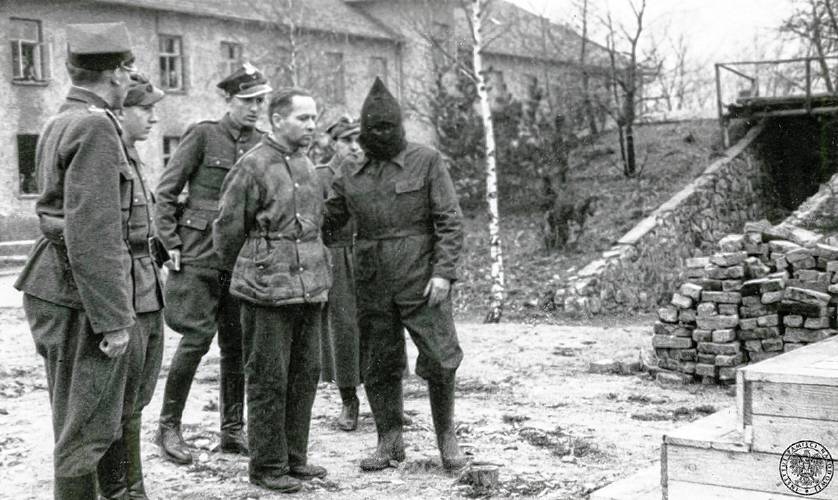
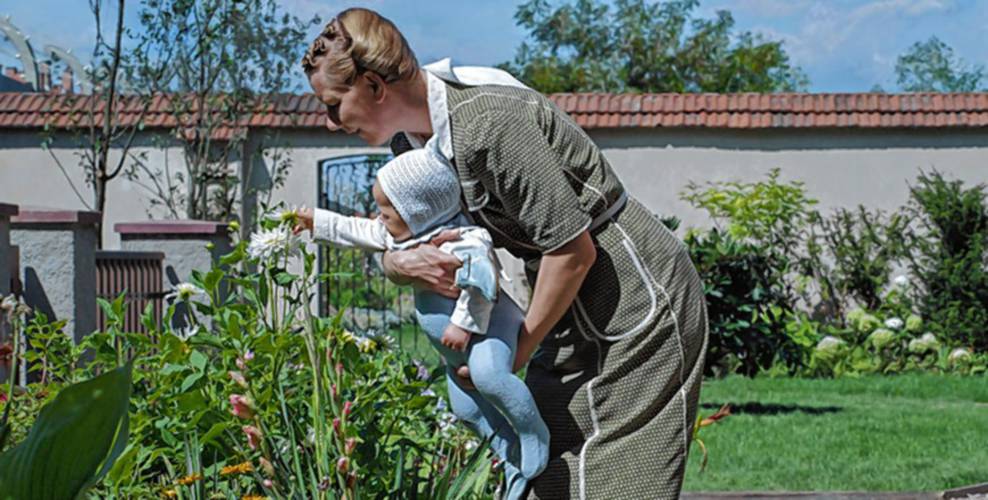
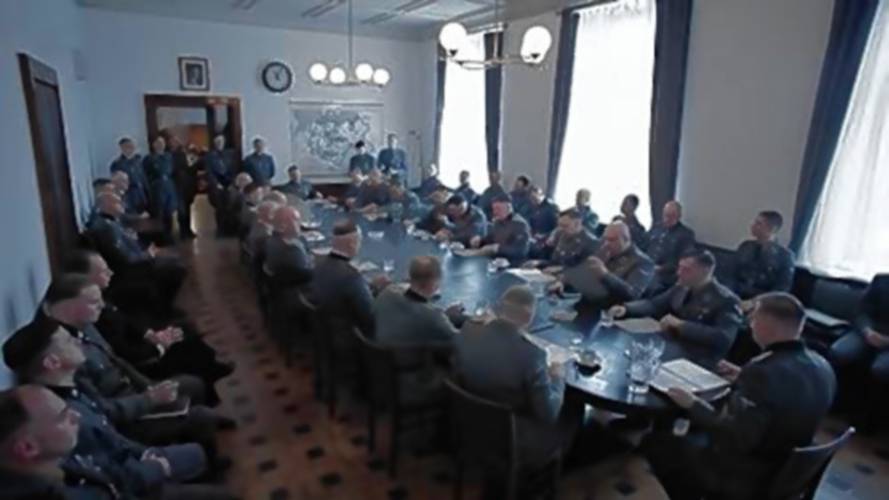
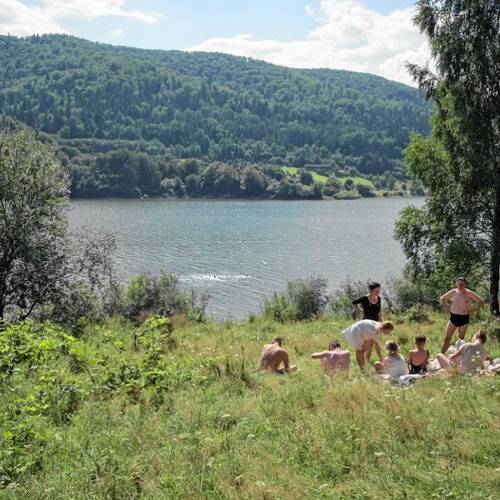
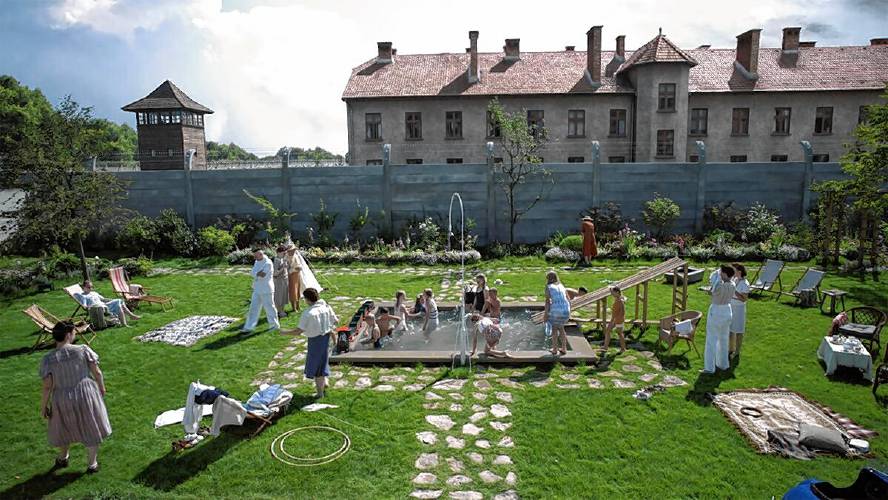
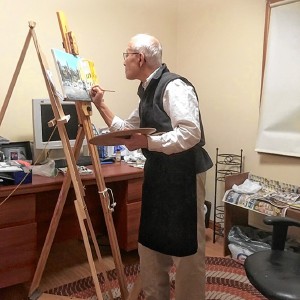 Proof that it’s never too late: Solo exhibit and free workshops honor the late Frederick Gao, a Belchertown resident who became a painter in his last five years
Proof that it’s never too late: Solo exhibit and free workshops honor the late Frederick Gao, a Belchertown resident who became a painter in his last five years Self-expression on display: ServiceNet members’ artworks on view at Greenfield Public Library through end of May
Self-expression on display: ServiceNet members’ artworks on view at Greenfield Public Library through end of May Embracing both new and old: Da Camera Singers celebrates 50 years in the best way they know how
Embracing both new and old: Da Camera Singers celebrates 50 years in the best way they know how Time to celebrate kids and books: Mass Kids Lit Fest offers a wealth of programs in Valley during Children’s Book Week
Time to celebrate kids and books: Mass Kids Lit Fest offers a wealth of programs in Valley during Children’s Book Week
